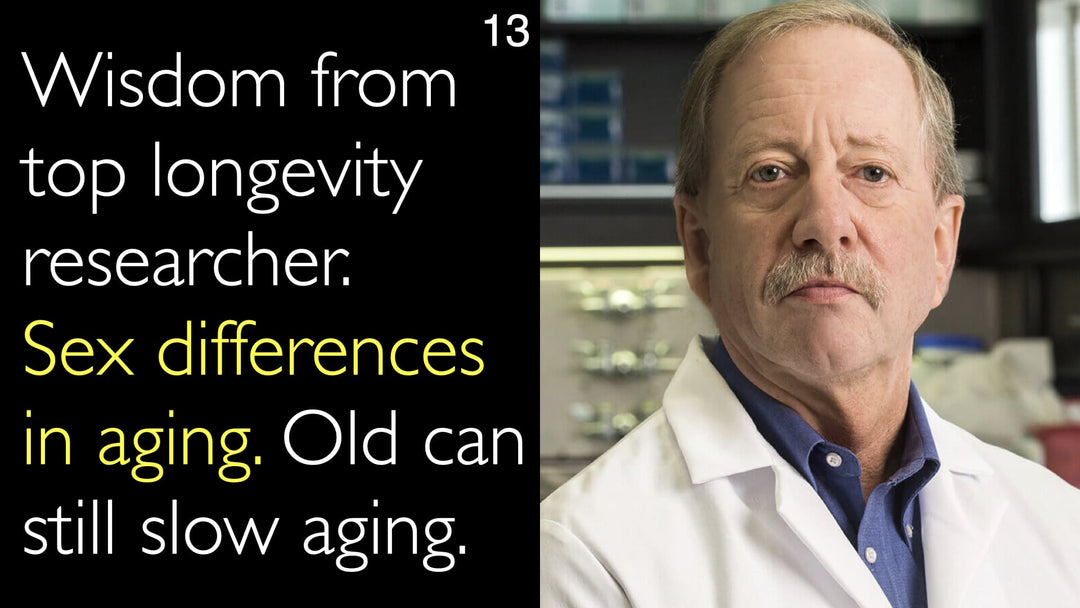Leading expert in aging and longevity, Dr. Steven Austad, MD, PhD, explains how starting anti-aging interventions later in life can still significantly increase lifespan. He reveals that medical treatments, exercise programs, and dietary changes initiated in older adulthood have a substantial positive impact on health and longevity. Dr. Steven Austad, MD, emphasizes that it is never too late to begin these interventions for improving later-life health outcomes.
Late-Life Anti-Aging Interventions for Increased Longevity
Jump To Section
- Late-Start Longevity Benefits
- Medical Treatments for Aging
- Exercise Programs for Older Adults
- Dietary Changes in Later Life
- Never Too Late to Intervene
- Full Transcript
Late-Start Longevity Benefits
Dr. Steven Austad, MD, PhD, discusses the surprising effectiveness of starting anti-aging interventions later in life. He explains that initiating treatments even in advanced age can produce substantial benefits for remaining lifespan. This represents a significant shift from previous thinking about the timing of longevity interventions.
Dr. Anton Titov, MD, explores this concept with Dr. Austad, who shares his professional evolution on this topic. The research shows that late-life interventions can meaningfully extend healthspan and lifespan.
Medical Treatments for Aging
Medical anti-aging treatments started later in life can significantly impact longevity according to Dr. Steven Austad, MD, PhD. These interventions include pharmaceutical approaches that target biological aging processes. Even when initiated in older adulthood, these treatments can modify disease risk and improve health outcomes.
Dr. Anton Titov, MD, discusses with Dr. Austad how modern medicine offers new possibilities for late-life health optimization. The conversation highlights that age should not be a barrier to considering medical interventions for healthy aging.
Exercise Programs for Older Adults
Exercise programs implemented later in life provide substantial longevity benefits, as explained by Dr. Steven Austad, MD, PhD. Research demonstrates that starting physical activity regimens in older age can improve cardiovascular health, muscle mass, and cognitive function. These changes directly contribute to extended healthspan and reduced mortality risk.
Dr. Anton Titov, MD, and Dr. Austad discuss how exercise remains one of the most effective anti-aging interventions regardless of when it's started. The evidence shows that mobility and strength improvements are achievable at any age with appropriate exercise programming.
Dietary Changes in Later Life
Dietary modifications in older adulthood can significantly impact longevity, according to Dr. Steven Austad, MD, PhD. Nutritional interventions started later in life can influence metabolic health, inflammation levels, and cellular repair processes. These changes contribute to improved health outcomes and extended lifespan.
Dr. Anton Titov, MD, explores with Dr. Austad how specific dietary patterns can benefit older individuals. The research indicates that nutritional optimization remains valuable throughout the lifespan, including in advanced age.
Never Too Late to Intervene
Dr. Steven Austad, MD, PhD, emphasizes that it's never too late to start anti-aging interventions for longevity benefits. He shares his personal professional evolution from believing interventions needed to start early to understanding that late-life approaches work effectively. This paradigm shift offers hope and opportunity for older adults seeking to improve their healthspan.
Dr. Anton Titov, MD, discusses with Dr. Austad the practical implications of this research for clinical practice and personal health decisions. The conversation highlights that age should not deter anyone from pursuing health optimization strategies.
Full Transcript
Dr. Steven Austad, MD: But the other surprising thing is how late in life we can start treatments, whether they are medical treatments, exercise programs, changes in diets, and still have a substantial effect on the remaining period of life.
I used to think that if you didn't start these things in your 20s or 30s, it was just too late to have much of an impact on later-life health. We now know that's not true. It's never too late.
That's the second surprise that I think I would have never suspected. And since I'm older now than I was when I started this, this is a very gratifying thing to discover.






